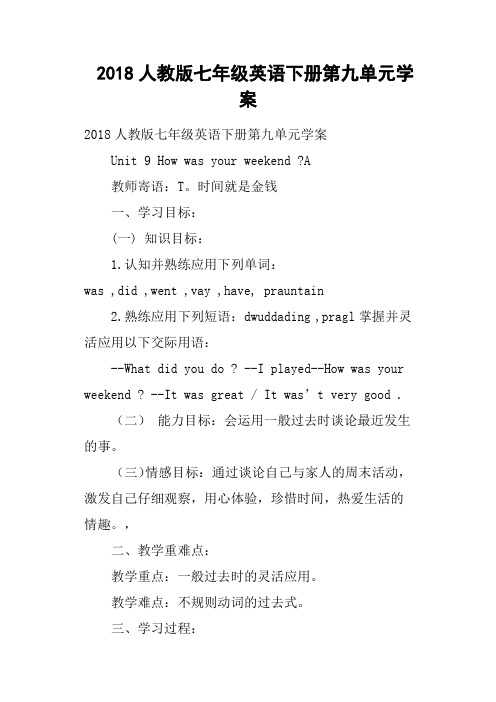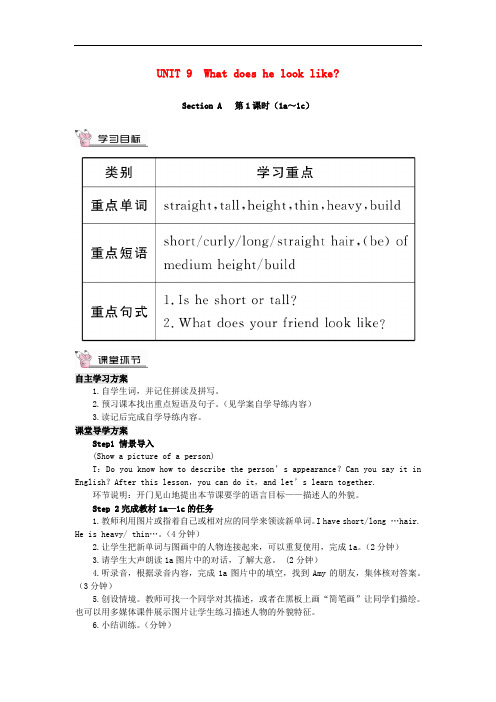2018人教版七年级英语下册第九单元学习型教学案
- 格式:doc
- 大小:28.00 KB
- 文档页数:18

人教版七下unit9全英教案Unit 9 Teaching PlanTeaching goals:1. Learn and use the key vocabulary and phrases in this unit.2. Understand and use the structure of "Whatshould/shouldn't/can/can't we do?" to make suggestions and express opinions.3. Develop students' speaking and listening skills through communicative activities.4. Cultivate students' cultural awareness by learning about different etiquette in different countries.Teaching procedures:Step 1: Warm-up1. Greet the students and check their homework.2. Show the students some pictures of people from different cultures and ask them to discuss what they notice about their outfits or behaviors. Encourage them to think about whether these behaviors are good or not.Step 2: Vocabulary building1. Present the new vocabulary in this unit, such as bow, hug, behavior, scissors, greeting, etc. Use pictures, gestures, and examples to help students understand the meanings.2. Give the students some practice exercises to consolidate the new vocabulary. For example, match the words with their meanings, complete the sentences with the correct words, etc.Step 3: Reading and listening1. Have the students read the text "Etiquette around the world" silently and underline the key information. Then discuss in pairs about what they have learned.2. Play the listening material for the students to listen and match the countries with their customs. After listening, check the answers with the whole class.Step 4: Speaking practice1. Divide the students into groups and have them discuss the questions in Activity 3 on page 64. Encourage them to express their opinions and give reasons for their choices.2. Role play: Have the students work in pairs and act out a conversation where they make suggestions about etiquette in different situations. For example, one student can be a visitor and the other can be a local person. They can discuss what the visitor should or shouldn't do.3. Group presentation: Assign each group a country and have them research and present on the etiquette customs in that country. They can use pictures, videos, and real-life examples to make their presentations more engaging.Step 5: Consolidation1. Have the students complete the exercises in the workbook to consolidate what they have learned in this unit.2. Review the key vocabulary and phrases with the students. Play some vocabulary review games, such as "Taboo", "Hot Seat", or "Charades".Step 6: Assessment1. Give the students a quiz to test their understanding of the vocabulary and grammar in this unit.2. Evaluate the students' speaking and presentation skills based on their performance in the role play and group presentation activities. Step 7: Homework1. Assign homework exercises from the workbook to reinforce what they have learned in this unit.2. Ask the students to write a short essay about their own culture's etiquette customs, comparing and contrasting them with those in other countries.。



2018人教版七年级英语下册第九单元学案2018人教版七年级英语下册第九单元学案Unit 9 How was your weekend ?A教师寄语:T。
时间就是金钱一、学习目标:(一) 知识目标:1.认知并熟练应用下列单词:was ,did ,went ,vay ,have, prauntain2.熟练应用下列短语:dwuddading ,pragl掌握并灵活应用以下交际用语:--What did you do ? --I played--How was your weekend ? --It was great / It was’t very good .(二)能力目标:会运用一般过去时谈论最近发生的事。
(三)情感目标:通过谈论自己与家人的周末活动,激发自己仔细观察,用心体验,珍惜时间,热爱生活的情趣。
,二、教学重难点:教学重点:一般过去时的灵活应用。
教学难点:不规则动词的过去式。
三、学习过程:1.预习导学及自测;预习导学:学习一般过去时:一般过去时表示___发生的动作(包括___性动作)、情况或存在的___一般过去时的谓语动词为was/were 或其他动词的过去式。
一般过去时的否定形式:主语+___+动词原形+其他或主语+___/___ + 其他.自测:写出下列动词的过去式:be________ go _____ come ________ do _______ clean ____Play______have_______study_______watch________see ______write______stop_______hope______live_______feel______know ______用所给动词的适当形式填空:1.Peter ______(visit)the beach last Saturday.2.—_______she ______(do)work ?—didHow______(be) your weekend ?_______(go )shopping wI ______(see) a talk show yesterdag.2..情境导入:Maybe every student likes weekends ,What did you do last weekend ? How was your weekend ? Please tryanswering the two qu.自主探究:(1.) Let’s look aure ,What did Lucy、Emma、Ben and Carol do last weekend ?Lab 、2 a and 2b:(2)I can write :--______________(上周末你做了什么)?--I____(做作业了)___________(踢足球了)________________(去海滩了)_____________(去看电影了)__________________(_拜访我阿姨了)______________(为数学考试而复习了)合作交流:(1)Discuss with your paur groud out how to answer the quabove. Pradrills wases abovairs. Fand 2c (2)a and do pairwork 3b.(3)We can all speak and write :___________________(你的周末过的怎么样)?It was ________(很棒)/___________(很无聊)5..拓展创新 groupwork Whose weekend wawonderful ?Introduce your weekend one bur grouwonderful weekend .Report :I had a busy weekend .On Saturdag ,Istuda….达标检测(一)根据句意,补全已给出首字母的单词。

UNIT 9 What does he look like?Section A 第1课时(1a~1c)自主学习方案1.自学生词,并记住拼读及拼写。
2.预习课本找出重点短语及句子。
(见学案自学导练内容)3.读记后完成自学导练内容。
课堂导学方案Step1 情景导入(Show a picture of a person)T:Do you know how to describe the person’s appearance?Can you say it in English?After this lesson,you can do it,and let’s learn together.环节说明:开门见山地提出本节课要学的语言目标——描述人的外貌。
Step 2完成教材1a—1c的任务1.教师利用图片或指着自己或相对应的同学来领读新单词。
I have short/long …hair. He is heavy/ thin…。
(4分钟)2.让学生把新单词与图画中的人物连接起来,可以重复使用,完成1a。
(2分钟)3.请学生大声朗读1a图片中的对话,了解大意。
(2分钟)4.听录音,根据录音内容,完成1a图片中的填空,找到Amy的朋友,集体核对答案。
(3分钟)5.创设情境。
教师可找一个同学对其描述,或者在黑板上画“简笔画”让同学们描绘。
也可以用多媒体课件展示图片让学生练习描述人物的外貌特征。
6.小结训练。
(分钟)(1)Li Lei B short and straight hair.A. is;isB. is;hasC. has;hasD. is;have(2)— What D your sister ?一She's tall.A. is;look likeB. /;likeC. does ;lookD. does ; look like(3)用is或has填空:①Lei Hao has short and straight hair.②Dick is tall,but his sister is short③Xie Kai is of medium height.④Du Ke is short and thin.环节说明:听说结合,第一时间向学生传达语言目标,通过结对对话练习和小结训练,语言目标得以强化。

人教版新目标七年级英语下册 Unit 9教学设计一. 教材分析人教版新目标七年级英语下册Unit 9主要围绕日常生活和一般现在时进行教学。
本单元主题明显,贴近学生生活,有利于激发学生的学习兴趣。
教材内容丰富,包括听力、口语、阅读和写作等方面,有助于学生全面提高英语水平。
此外,教材还设计了多样化的练习和活动,便于教师进行课堂教学和学生自主学习。
二. 学情分析七年级的学生已具备一定的英语基础,对日常生活话题有一定的了解。
但部分学生在语言表达和听力方面仍存在困难,因此需要教师针对性地进行引导和辅导。
此外,学生对新鲜事物充满好奇,善于模仿和参与活动,教师应充分利用这一特点,激发学生的学习兴趣。
三. 教学目标1.知识目标:学生能够掌握Unit 9中的单词、短语和句型,了解一般现在时的用法。
2.能力目标:学生能够熟练运用所学知识进行日常交流,提高听、说、读、写的能力。
3.情感目标:通过本单元的学习,学生能够增进与他人的友谊,培养合作精神。
四. 教学重难点1.重点:单词、短语和句型的学习和运用。
2.难点:一般现在时的用法和听力理解。
五. 教学方法1.任务型教学法:通过设定各种实际生活中的任务,引导学生参与课堂活动,提高语言实际运用能力。
2.情境教学法:创设生活情境,让学生在真实环境中学习英语。
3.交际法:注重学生之间的互动交流,提高口语表达能力。
六. 教学准备1.教材、教学参考书和多媒体教学资源。
2.录音机、课件和教学卡片。
3.学生分组,准备角色扮演等活动。
七. 教学过程1.导入(5分钟)教师通过与学生打招呼,询问身体状况等日常话题,引入本课主题。
引导学生谈论日常生活中的一般现在时,激发学生学习兴趣。
2.呈现(10分钟)教师展示课件,呈现Unit 9的单词、短语和句型。
通过图片、例句等方式,对新词汇和短语进行讲解,让学生初步感知和理解。
3.操练(10分钟)教师学生进行口语练习,运用新学的单词、短语和句型进行角色扮演。
【更新】人教版七年级下册英语Unit9第九单元优秀教案一、教学目标1. 掌握单词:hope, future, astronaut, enjoyable, unhappy2. 能够流利地运用一般将来时来表达将来的计划和希望3. 能够听懂并理解关于未来的对话和问题4. 能够合作完成与未来规划相关的活动二、教学重点1. 研究、掌握一般将来时的用法2. 培养学生对未来计划和希望的表达能力三、教学准备1. 学生课本和练册2. 多媒体设备和教学投影仪四、教学过程1. 导入(5分钟)引导学生讨论一下他们的未来计划和希望,激发学生研究的兴趣和积极性。
2. 教学主体(30分钟)a. 复和引入新知识通过多媒体展示相关图片,引入新单词和短语,并帮助学生掌握其含义。
b. 教授一般将来时的用法详细解释一般将来时的构成和用法,例如:主语 + will + 动词原形。
通过示例句子和练帮助学生理解和掌握。
c. 练与拓展让学生进行口头和书面练,练运用一般将来时进行句子构造和对话。
同时,组织小组活动,让学生合作讨论自己的未来计划。
3. 巩固与反馈(15分钟)通过问题和对话练,巩固学生对一般将来时的掌握程度。
同时,对学生的合作活动进行评价,并给予反馈和鼓励。
五、教学延伸鼓励学生在家进行额外的练,巩固所学的知识。
可以提供一些相关的练题和研究资源。
六、教学评价通过对学生的口头和书面练进行评价,了解学生对一般将来时的掌握程度,并给予针对性的指导。
七、教学反思根据教学实际情况,对本节课的教学效果进行总结和反思,为下一次教学做出调整和提升。
八、课后作业完成课本和练习册上相关的练习题,并继续思考自己的未来计划和希望。
Unit 9 What does he look like?Section A教学模式介绍探究式课堂教学模式的教学环节:创设情境——启发思考——自主(或小组)探究——协作交流——总结提高探究式教学模式是指在教学过程中,要求学生在教师指导下,通过以“自主、探究、合作”为特征的学习方式对当前教学内容中的主要知识点进行自主学习、深入探究并进行小组合作交流,从而较好地达到课程标准中关于认知目标与情感目标要求的一种教学模式。
同时侧重小组研究和小组活动,关注学生自主性。
设计思路说明【创设情境】教师展示一些人物图片,并提问学生他们看上去怎么样,创建描述人物的情境,学生在这个情境中学会一些形容人的词。
学生在任务中熟悉如何描述人物外貌。
【启发思考】教师提出问题:what does your friend look like?引发学生思考运用前面的形容词,通过图片的运用引导学生进行人物外貌的描述。
【自主或小组探究】学生通过听力部分的材料学会更多的描述人物长相的表达,在此过程中训练其听力。
并通过听力首先学习主谓一致be动词是用is还是are,然后再听一遍完成表格达到巩固。
【协作交流】学生通过你说我猜的游戏既能把所学运用到实际游戏的交流中同时又有趣味性,能极大的吸引学生参与。
而接下来的角色扮演是对这一部分的总结,学生在情境对话中互相交流,加强所学知识的识记。
【总结提高】通过前面几个环节的不断练习,引导学生进行总结:描述人物外貌特征。
并通过后面的练习进行巩固提升,同时讲解本单元的语法并通过相应的练习进行巩固。
教材分析本节课人物外貌的特征如:高矮胖瘦等内容,讲述了与人交流过程中如何描述他人的长相。
A部分内容上主要与人物特征相关,侧重教会学生如何描述目标人物比如:明星,同学,亲戚,朋友等等。
本部分教学结束时,学生应当重点掌握并能熟练、正确的运用课本知识。
教学目标【知识与能力目标】学会各种外貌特征的表达方式如:长头发短头发,卷头发直头发,高,矮,胖等等【过程与方法目标】学生用正确的语言谈论他人长相特点,用what does he look like?/ Do they have…句型进行提问,能够就该话题与他人进行简单的口语交流【情感态度价值观目标】通过人物外貌的交流让学生能够意识到外貌不能决定一切,不应该太过在意外貌教学重难点【教学重点】学习并掌握what does he look like?\Do they have…等相关句型和词汇。
2018人教版七年级英语下册第九单元学案Unit9Howwasyourweekend?SectionA教师寄语:Timeismoney。
时间就是金钱一、学习目标:知识目标:.认知并熟练应用下列单词:was,did,went,visit,test,stay,have,practicemountain2.熟练应用下列短语:dosomehomework,studyforthesciencetest,dosomereading ,practiceEnglish3.掌握并灵活应用以下交际用语:--whatdidyoudo?--Iplayedtennis.--Howwasyourweekend?--Itwasgreat/Itwas’tverygood.(二)能力目标:会运用一般过去时谈论最近发生的事。
(三)情感目标:通过谈论自己与家人的周末活动,激发自己仔细观察,用心体验,珍惜时间,热爱生活的情趣。
,二、教学重难点:教学重点:一般过去时的灵活应用。
教学难点:不规则动词的过去式。
三、学习过程:.预习导学及自测;预习导学:学习一般过去时:一般过去时表示___发生的动作(包括___性动作)、情况或存在的___一般过去时的谓语动词为was/were或其他动词的过去式。
一般过去时的否定形式:主语+___+动词原形+其他或主语+___/___+其他.自测:写出下列动词的过去式:be________go_____come________do_______clean____Play______have_______study_______watch________see__ ____write______stop_______hope______live_______feel ______know______用所给动词的适当形式填空:.Peter______thebeachlastSaturday.2.—_______she______herhomework?—yes,shedid.3.How______yourweekend?4.Sheoften_______shoppingwithhersister.5.I______atalkshowyesterdaymorning.2..情境导入:maybeeverystudentlikesweekends,whatdidyoudolastweek end?Howwasyourweekend?Pleasetryansweringthetwoquest ions.3..自主探究:Let’slookatthepicture,whatdidLucy、Emma、Benandcaroldolastweekend?Listentothetape,finishoff1 b、2aand2b:Icanwrite:--______________?--I_______________(踢足球了)________________(去海滩了)_______________________________Discusswithyourpartnerinyourgroup ,trytofindouthowtoanswerthequestionsabove.Practiset hedrillswiththephrasesaboveormoreinpairs.Finishoff1cand2c(2)finishoff3aanddopairwork3b.wecanallspeakandwrite:___________________?Itwas________/___________5..拓展创新groupworkwhoseweekendwasthemostwonderful?Introduceyourweekendonebyoneinyourgroup,choosethemo stwonderfulweekend.Report:Ihadabusyweekend.onSaturdaymorning,Istudiesf orthemathtest,…..6.达标检测(一)根据句意,补全已给出首字母的单词。
2018人教版七年级英语下册第九单元学案Unit9Howwasyourweekend?SectionA教师寄语:Timeismoney。
时间就是金钱一、学习目标:知识目标:.认知并熟练应用下列单词:was,did,went,visit,test,stay,have,practicemountain2.熟练应用下列短语:dosomehomework,studyforthesciencetest,dosomereading ,practiceEnglish3.掌握并灵活应用以下交际用语:--whatdidyoudo?--Iplayedtennis.--Howwasyourweekend?--Itwasgreat/Itwas’tverygood.(二)能力目标:会运用一般过去时谈论最近发生的事。
(三)情感目标:通过谈论自己与家人的周末活动,激发自己仔细观察,用心体验,珍惜时间,热爱生活的情趣。
,二、教学重难点:教学重点:一般过去时的灵活应用。
教学难点:不规则动词的过去式。
三、学习过程:.预习导学及自测;预习导学:学习一般过去时:一般过去时表示___发生的动作(包括___性动作)、情况或存在的___一般过去时的谓语动词为was/were或其他动词的过去式。
一般过去时的否定形式:主语+___+动词原形+其他或主语+___/___+其他.自测:写出下列动词的过去式:be________go_____come________do_______clean____Play______have_______study_______watch________see__ ____write______stop_______hope______live_______feel ______know______用所给动词的适当形式填空:.Peter______thebeachlastSaturday.2.—_______she______herhomework?—yes,shedid.3.How______yourweekend?4.Sheoften_______shoppingwithhersister.5.I______atalkshowyesterdaymorning.2..情境导入:maybeeverystudentlikesweekends,whatdidyoudolastweek end?Howwasyourweekend?Pleasetryansweringthetwoquest ions.3..自主探究:Let’slookatthepicture,whatdidLucy、Emma、Benandcaroldolastweekend?Listentothetape,finishoff1 b、2aand2b:Icanwrite:--______________?--I_______________(踢足球了)________________(去海滩了)_______________________________Discusswithyourpartnerinyourgroup ,trytofindouthowtoanswerthequestionsabove.Practiset hedrillswiththephrasesaboveormoreinpairs.Finishoff1cand2c(2)finishoff3aanddopairwork3b.wecanallspeakandwrite:___________________?Itwas________/___________5..拓展创新groupworkwhoseweekendwasthemostwonderful?Introduceyourweekendonebyoneinyourgroup,choosethemo stwonderfulweekend.Report:Ihadabusyweekend.onSaturdaymorning,Istudiesf orthemathtest,…..6.达标检测(一)根据句意,补全已给出首字母的单词。
.Theyp_______EnglishonSunday.stSaturday,wangPingv______hergrandmother.3.DoesTomoftendosomer________?4.Therearetworiversatthefootofam_________.5.Heisstudyingforthematht_______.(二)用所给短语的适当形式填空。
practiceEnglish,studyforthetest,stayathome,gototheb each,haveaparty.jane’sbirthdayiscoming.Let’s_______________2.They______________lastweekend,Thebeachwasgreat.3.He____________everyday.Sohecanspeakitwell.4.HermotherwenttoBeijing,soshehasto____________5.She’s_______________now.单项选择。
.He________tothemovieslastweekend.A.wentB.goesc.go2.How______thebeef?A.wereB.didc.was3.Tonyisstudying___theEnglishtest_______TuesdaymorningA.for,inB.for,onc.at,on4.—Howwasyourweekend,Sarah?--_______A.SureB.Itwasgreatc.Iplayedtennis.5.whatabout______?A.dosomereadingB.doinganyreadingc.doingsomereading(四)按要求完成句子。
.myweekendwasboring.(对划线部分提问)_____________yourweekend?2.HevisitsBeijingeveryyear.He______Beijing_________________。
3.Tonydidhishomework.(变为否定句)Tony___________hishomework.4.mingwatchedTVandcleanedtheroom.变为一般疑问句)_____ming____TVand____theroom?四.典例解析:上周末他在家读书了。
Hedid_________athome.答案为somereading。
dosomereading表示“读,阅读”,类似的表达方式还有:dosomeshopping“购物”;dosomewriting“写,写作”;dosomecleaning“打扫卫生”onSunday,Lucyoftendoessome_______Iwant______anarticleforthemagazine.Hepractices______everyday.答案为drawing。
Practice后接名词或动词-ing形式,Practicedoingsth.练习干…Tim____________everyday.Tim每天练习篮球。
Shepractices______________onSunday.她在周日练习弹钢琴。
我们每天练习说英语。
we_______________________everyday.Tom在练习写字。
Tom_____________________________.whatabout_______tennis?A.playingB.toplayc.playD.pla ys答案为A。
about为介词,后面的动词应该为-ing形式whatabout________(go)outtodinner?(4)--whydidn'tyougivemeaphonecall?--I__________.Butnobodyansweredthephone.A.DoBdidc.willD.have解题:选B。
本题考查助动词的选择。
问句用的一般过去时,答句也应用一般过去时,助动词did用来代替原句中的动词。
(5)Allthepeople______interestedinthefilmtheysawyesterd ayevening.A.isB.willbec.wasD.were解题:选D。
本题考察一般过去时的用法。
由yesterdayevening可知,该句应该使用一般过去时,AB项先排除;主语为人们,复数,故排除C(6)myfather__________somemoneyinhisbagandwentaway.A.putsB.hasputc.putD.putting解题:选C。
本题考查动词put的形式。
and连接的前后动词形式要一致,所以应填put的过去时,put的过去时还是put.五、中考链接.(XX.山西)Thisbluebikeistooexpensive.couldyoushowmea____one?A.cheapB.cheaperc.cheapest2.-Let’sgototheconcert,michael!-Sorry,I______.Ihavetohelpmymotherwiththehousework..A.mustn’tB.maynotc.needn’tD.can’t3.(XX.鸡西)-Anumberofstudents____inthedininghall.-Letmecount.Thenumberofthestudents_____about400.A.are,isB.is,arec.are,are六、小结回扣:一般过去时表示_____________规则动词的变化规则包括___种,分别是___________________________________________________ _______本课的两个重要句型是____________________________________________本课的常用短语:做作业_____________踢足球_____________去海滩__________打网球___________去看电影_________拜访某人___________练习英语___________阅读_______为数学测验复习________________Unit9Howwasyourweekend?SectionBTeacher'swords:Timeandtidewaitfornoman.Doyouknowthe phrasesaccordingtoyourpreparation.?Pleasehaveatry.Playedtheguitar_________didmyhomework______________ _____Studiedgeography____________wenttothelibrary______________cleanedherroom___________-wroteanewsong____________ ____Sawaninterestingtalkshow___________alittledifficult ___________自测:writethewords:英语______数学______语文_____体育____音乐______美术_____Translatethesentence:上周末你做什么了?_______________________________我练习英语了。